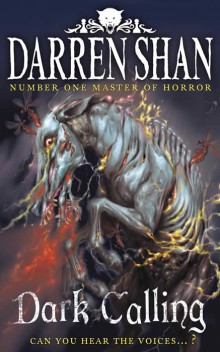Plot Outline:
Dark Calling , the 9th book of The Demonata, is set around the same time period as Death's Shadow and Wolf Island, so certain events near the start of the book overlap. Kernel is the narrator. While Grubbs was struggling with his wolfen half on Wolf Island, and while Bec and Beranabus were facing the Shadow in the hold of a zombie-plagued ship, Kernel was facing up to some REAL problems!!Since he rebuilt his eyes after the events described in Book 6, Kernel has been seeing strange lights (even stranger than usual!) and hearing mysterious voices, telling him to "Come..." The Old Creatures which we first encountered in Bec have returned to Earth, with the sole purpose of taking Kernel away from it. Against his wishes, he is dragged across the universe by a creature older than time, who promises to reveal the secrets of creation to him.
Kernel's wild journey is a dangerous one, and the more he learns about the past and his role in the universe, the more he wishes he had been left alone on Earth. The truth is that the stakes are far higher than the Disciples ever imagined, and ours is not the only world at risk. A war had been waged between demons and the beings of our universe since the start of time, and it is reaching its conclusion, one in which victory for the demon forces seems all but assured. The Old Creatures have a plan for Kernel, but it's not that he likes, and it's not going to save Earth from the savage forces of the Demonata...
Author Notes:
Dark Calling, book 9 of The Demonata, was released on 1st May 2009. I started work on the book on February 14th 2006, and did my final edit in November 2008. It sold more copies in its first week than any other book of mine had done before, but failed to hit the #1 spot because it was released during the middle of the Twilight craze -- oh, the irony, held off the top by books about vampires!!I was very pleased with the title of this book, partly because it suits the book very well and has a few different meanings (which become apparent when you read the book), but mostly because it's the most difficult time I've ever had coming up with a title! Titles vary from book to book. Sometimes the name will come to me first, and I'll have it in place from the very beginning. Other times I'll come up with it during the writing process. And occasionally it will only come late in the day, when the book has been edited and is nearing the printing stage. In this instance the first working title was The Divine Horror. I was never happy with that, but at least it gave me something to call the book. A year and a half later, I shortened it to Divine Horror, in case that would grab me any more, but it didn't. Nearly a year after that, I changed it to Eternity's Crux. I liked that title, as it tied in very neatly with the story line and hinted at the sci-fi elements that play an important part in the book. But I suspected it was a title that other people wouldn't warm to, and as soon as it went to my editor, that was confirmed. The trouble was, we couldn't come up with anything else that both of us liked. It needed to be short and snappy, yet it also needed to relate to the plot. But book 9 had a very complicated plot! We bounced ideas back and forth. Some of the titles in the mix included Destiny's Eyes, Creatures of the Dark, and Dark Matters. We both liked the "dark" theme, so I played with it a bit more and came up with titles such as Dark Eyes, Monsters of the Dark, and Call of the Dark. That last name struck a chord with me. I knew it wasn't quite right, but I sensed I was close. With the production team baying for a title (we literally came within 24 hours of the deadline!), I played around with Call of the Dark on my way to the theatre (I was going to see a play called Fat Girl), and came up with Dark Calling. I instantly knew the problem had been solved, and luckily my editor agreed straightaway as soon as I sent it to her. And so the title of book 9 finally came to be.
Dark Calling wasn't the most difficult book of the series to write (that was Bec, because of all the research it involved), but it was by far and away the most difficult to edit. The first draft of the book came quite easily, but I knew when I was writing it that it was too long as it stood -- but I needed to get all of my ideas down on paper, so I just went with it, knowing that I'd have to cut out a lot of what I was writing at a later date. That draft came in just under 62,000 words -- the final draft, nearly 3 years later, was 43,500 word, meaning I cut out almost a third!
Before anyone starts moaning about the discarded material, and asking for a "director's cut", I must point out it was all material that needed to be cut. As I said above, I knew even while I was working on the first draft that I couldn't go ahead with it as it stood. The book came to a virtual standstill in the middle, with all sorts of theories and explanations being bandied around. There was almost no action between the first and final thirds, and far too much talk. It was vital to set me on the path to the final draft, to bring together all of the ideas which were whirling around inside my head, so that I could then study them on paper and decide what needed to stay and what could go. I enjoyed writing the first draft immeasurably, but I knew that nobody else would enjoy it as it stood, so I then got stuck into the long, complex task of knocking it into an entertaining shape.
Book 9 had the difficult task of explaining much of the background to the series, where the demons came from, why they were so powerful, who and what the Old Creatures were, why the kah-Gash fractured, the exact nature of its power -- it even had to explain the Big Bang and the origin of our universe! As I explained in my notes for Demon Thief, that book was actually the sixth in the series that I wrote, written after Lord Loss, Bec, Slawter, Blood Beast and Demon Apocalypse. I was still putting together my ideas about the Demonata while writing those five books, trying to figure out all of their history, where Grubbs and Bec and the Disciples fit into a bigger story. I knew how I wanted the series to end, but I needed to know more about the demons in order to get there. It was when I came up with the ideas for Demon Thief that everything came together, and that I realised the order in which the books needed to be released. At that point it became clear that Kernel Fleck would have to serve as the "answers man" in the series, the glue which would bind the other books together and explain everything that was happening in them. We learnt a lot about the demon universe in Book 2, when Kernel was the narrator. In Book 9 we would learn even more, not just about the demon universe, but ours too.
The question I get asked more than any other (and I'm sure every other writer gets asked it the most too), is where do my ideas come from? The answer is, I take them from all over the place, from books, movies, TV shows, things I see in real life, things I learn about when I travel around the world, stuff I read about in newspapers or on the web, etc. etc. Ideas come from anywhere and everywhere. Normally I can't trace a book to a particular source -- they're a mishmash, blending bits and pieces from all over the place, mostly on a subconscious level. But I know precisely where the ideas for Dark Calling first began to come together inside my head, even though it would be many years before I found a way to run with those ideas -- it began with the movie 2001: A Space Odyssey, a novel called Childhood's End by Arthur C Clarke (who also wrote the screenplay for 2001), and A Brief History Of Time, the non-fiction book by Stephen Hawking. Surprising source material for a horror book, you might think, but then Dark Calling isn't any ordinary sort of horror book.
As much as I love horror, I love fantasy and sci-fi too, and I always look for ways to blend those genres into my books. Thus the fantasy angle of Lake of Souls, in The Saga, and the time travelling, science fiction bits in both Sons of Destiny and Demon Apocalypse. I don't see my books as "just" being horror books -- I like to think they're much more than that, a mix of genres, which is why they appeal to so many readers. I first saw 2001 at a pretty young age, and it made a big impression on me. It's a film I've watched many times, and plan to continue re-watching over the years to come. I loved its scope, the way it questioned our origins, the advent of intelligence, the path we have trod as humans. Later I read Childhood's End and that was similarly impactful, urging me to wonder about our role in the universe, the evolution of our species, what might be coming next. While studying in university in the early 1990s, I also read A Brief History of Time, and it fascinated me. The book has a reputation as being the most unread book ever, i.e. millions of people bought copies, but apparently lots of people who bought it didn't read it -- they either just wanted to show it off, to make themselves look clever, or they couldn't get past the first few pages. I don't know if that's true or not, but I certainly enjoyed the book. It was an accessible, intriguing look at our universe, our concept of time, and a whole lot more.
That movie and those two books have influenced a lot of my writing in all sorts of ways, but I drew upon them more than usual in Dark Calling. I saw this as a chance to put my own spin on the matter, to add my story to that of countless others which purport to explain how life first began. I don't mean for Dark Calling to be taken literally (I don't really believe that there was a universe full of demons in existence before ours!), but it does tie in fairly closely with what Professor Hawking proposed. There's often a thin line between science fiction and science fact, and I like it when the two blend. I think you can't have one without the other -- sci-fi often throws ideas out into the world, which "proper" scientists later seize upon, explore fully, and transform into fact. e.g. the idea of rockets began with science fiction. Dark Calling isn't meant to be read as a factual book, but I hope it will get readers thinking about the nature of time and space, the structure of our universe, the possibility of places that operate differently to ours, and that it maybe leads them to A Brief History of Time or other such work -- or at least gives them some new and fun things to consider in their idle moments.
Anyway, as I said above, I drew all of my ideas together and put them down on paper when I wrote the first draft of Dark Calling. Then I went through it several times over the coming months and years and turned my theorising into exciting fiction. I trimmed the middle section massively, and added as much action as I could. In the first draft, the Old Creature appeared only as a ball of light -- in later drafts, I realised that was too alienating, and had him adopt the features of a couple of characters from earlier books. Kernel experiences life on other worlds in this book, and in the first draft I went into more detail about the aliens he encounters -- when I re-read, I realised this bogged the book down, so I trimmed back a lot of those details. I threw in a few fight scenes, re-writing dry passage to include attacks by demons. And always I fine-tuned, tightened up, and did all that I could to make the book as readable and fun as possible.
I think all that hard work paid off in the end. Dark Calling is a book that will hopefully "blow your mind" and lead you off in all sorts of unexpected directions. But it's an enjoyable read too. It's not quite as fast-moving as other books in the series, but it belts along at a fair old pace all the same -- Kernel is on the move from first page to last. It also features an explosive final third, when Kernel returns to Earth from his adventures and links up with Bec and Grubbs again. It would have been a glorious reunion in any other series, the three heroes coming together smoothly and wisely to put their experiences to good use and save the world. But this is a series about the lost and the damned, and things aren't going to run quite as neatly as that! By the end of book 9 and its dark, unexpected climax, I'm hoping readers are going to feel as sickened and doomed as Kernel and the other Disciples. The end of the world is coming, people, and the "heroes" who were meant to save us are the ones we probably need to be most afraid of...
Welcome to the Dark!
p.s. While I was working on the editing process, Waterstones in the UK proposed a competition in which the winner would get to name and design and demon for inclusion in the book. I was dubious of the idea at first, but then I spotted the perfect place where I could put such a creature, and I gave the competition the go-ahead. The winner, Tom Woodhead, came up with a horrible little demon called the Sligstata -- and I was so impressed with it, I asked HarperCollins to use a picture of it on the cover of the book!
Global Cover Variations
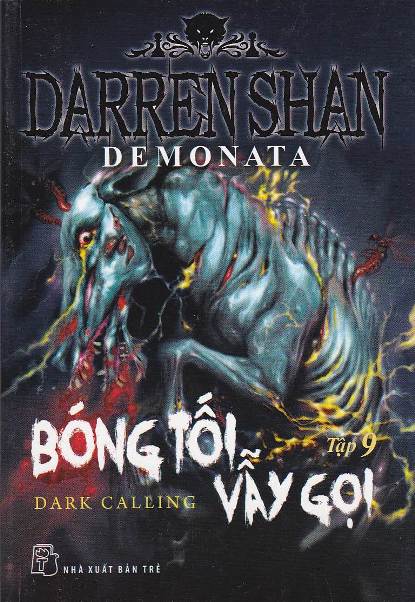 Dark Calling (Vietnam)
Dark Calling (Vietnam)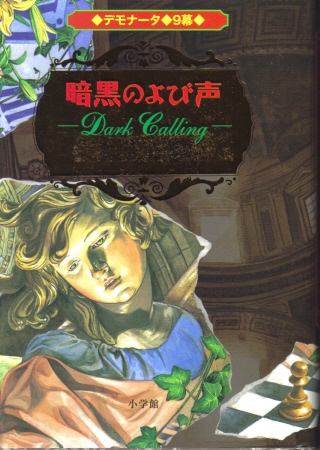 Dark Calling (Japan)
Dark Calling (Japan)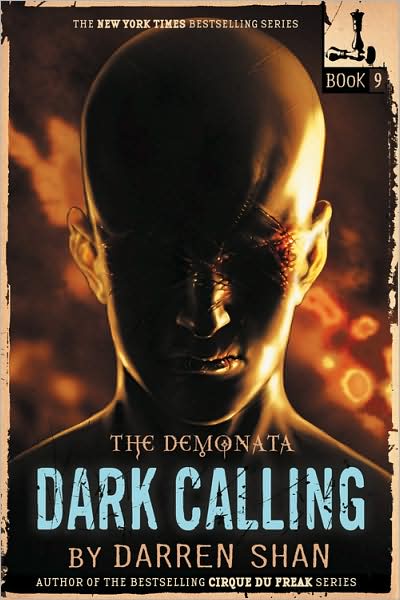 Dark Calling (USA)
Dark Calling (USA) Dark Calling (Japan)
Dark Calling (Japan)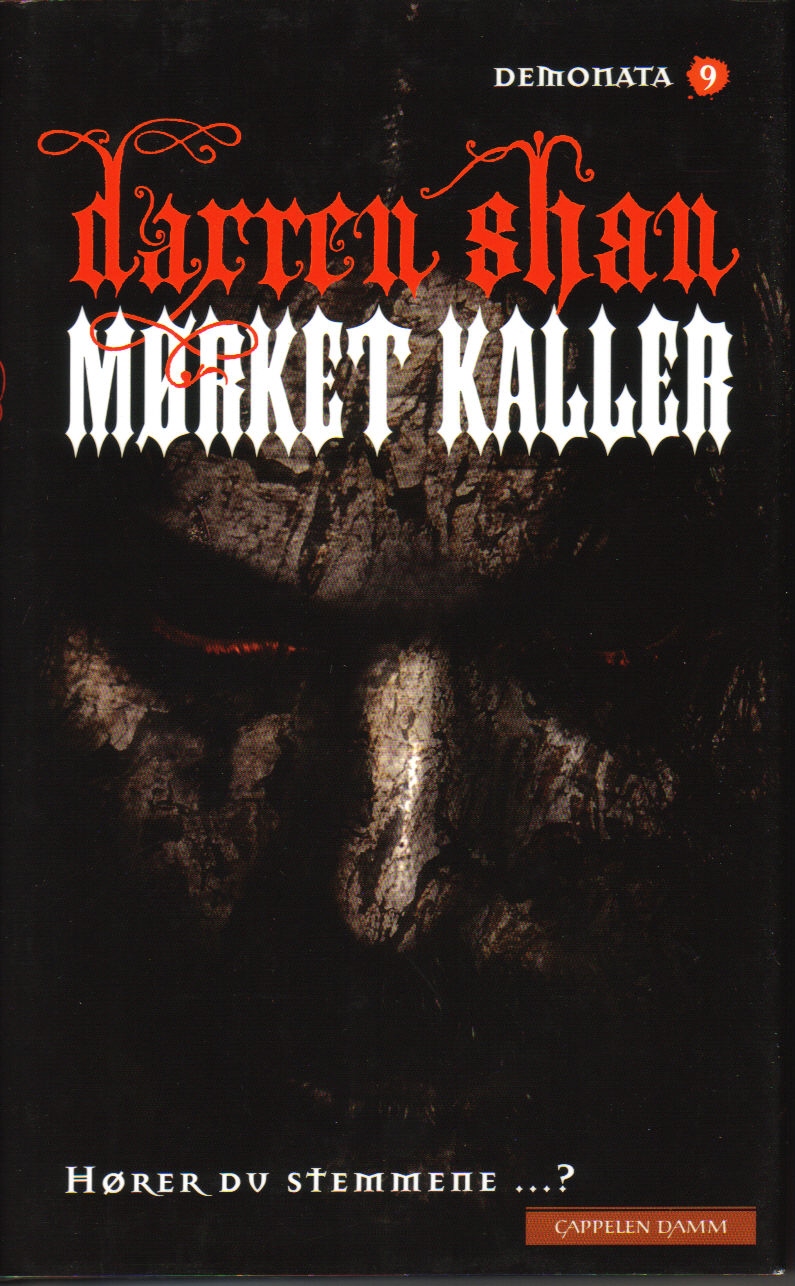 Dark Calling - Norway
Dark Calling - Norway